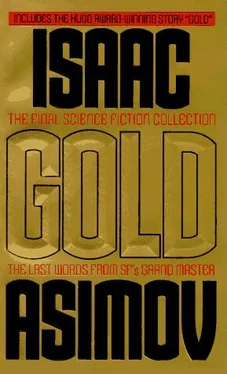Isaac Asimov - Gold - The Final Science Fiction Collection
Здесь есть возможность читать онлайн «Isaac Asimov - Gold - The Final Science Fiction Collection» весь текст электронной книги совершенно бесплатно (целиком полную версию без сокращений). В некоторых случаях можно слушать аудио, скачать через торрент в формате fb2 и присутствует краткое содержание. Год выпуска: 2003, ISBN: 2003, Издательство: Eos, Жанр: Фантастика и фэнтези, на английском языке. Описание произведения, (предисловие) а так же отзывы посетителей доступны на портале библиотеки ЛибКат.
- Название:Gold: The Final Science Fiction Collection
- Автор:
- Издательство:Eos
- Жанр:
- Год:2003
- ISBN:ISBN: 0-060-55652-8
- Рейтинг книги:3 / 5. Голосов: 1
-
Избранное:Добавить в избранное
- Отзывы:
-
Ваша оценка:
- 60
- 1
- 2
- 3
- 4
- 5
Gold: The Final Science Fiction Collection: краткое содержание, описание и аннотация
Предлагаем к чтению аннотацию, описание, краткое содержание или предисловие (зависит от того, что написал сам автор книги «Gold: The Final Science Fiction Collection»). Если вы не нашли необходимую информацию о книге — напишите в комментариях, мы постараемся отыскать её.
Gold: The Final Science Fiction Collection — читать онлайн бесплатно полную книгу (весь текст) целиком
Ниже представлен текст книги, разбитый по страницам. Система сохранения места последней прочитанной страницы, позволяет с удобством читать онлайн бесплатно книгу «Gold: The Final Science Fiction Collection», без необходимости каждый раз заново искать на чём Вы остановились. Поставьте закладку, и сможете в любой момент перейти на страницу, на которой закончили чтение.
Интервал:
Закладка:
Feghoot watched with interest as a husband and wife were brought in, charged with disturbing the peace. During a religious observation, when for twenty minutes the congregation was supposed to maintain silence, while concentrating on their sins and visualizing them as melting away, the woman had suddenly risen from her squatting position and screamed loudly. When someone rose to object, the man had pushed him forcefully.
The judges listened solemnly, fined the woman a silver dollar, and the man a twenty-dollar gold piece.
Almost immediately afterward, seventeen men and women were brought in. They had been ringleaders of a crowd that had demonstrated for better quality meat at a supermarket. They had torn the supermarket apart and inflicted various bruises and lacerations on eight of the employees of the establishment.
Again the judges listened solemnly, and fined the seventeen a silver dollar apiece.
Afterward, Feghoot said to the chief judge. “I approved of your handling of the man and woman who disturbed the peace.”
“It was a simple case,” said the judge. “We have a legal maxim that goes, ‘Screech is silver, but violence is golden.’”
“In that case,” said Feghoot, “why did you fine the group of seventeen a silver dollar apiece when they had committed far worse violence?”
“Oh, that’s another legal maxim,” said the judge. “Every crowd has a silver fining.”
Fault-Intolerant
9 January
I, Abram Ivanov, finally have a home computer; a word processor, to be exact. I fought it as long as I could. I argued it out with myself. I am America’s most prolific writer and I do fine on a typewriter. Last year I published over thirty books. Some of them were small books for kids. Some were anthologies. But there were also novels, short story collections, essay collections, nonfiction books. Nothing to be ashamed of.
So why do I need a word processor? I can’t go any faster. But, you know, there’s such a thing as neatness. Typing my stuff means I have to introduce pen-and-ink items to correct typos, and nobody does that anymore. I don’t want my manuscripts to stick out like a sore thumb. I don’t want editors to think my stuff is second rate, just because it is corrected.
The difficulty was finding a machine that wouldn’t take two years to learn to use. Deft, I’m not-as
I’ve frequently mentioned in this diary. And I want one that doesn’t break down every other day. Mechanical failures just throw me. So I got one that’s “fault-tolerant. “ That means if some component goes wrong, the machine keeps right on working, tests the malfunctioning component, corrects it if it can, reports it if it can’t, and replacements can be carried through by anybody. It doesn’t take an expert hacker.
Sounds like my kind of thing.
5 February
I haven’t been mentioning my word processor lately, because I’ve been struggling to learn how it works.
I’ve managed. For a while, I had a lot of trouble, because although I have a high IQ, it’s a very specialized high IQ. I can write, but coping with mechanical objects throws me.
But I learned quickly, once I gained sufficient confidence. What did it was this. The manufacturer’s representative assured me that the machine would develop flaws only rarely, and would be unable to correct its own flaws only exceedingly rarely. He said I wouldn’t be likely to need a new component oftener than once in five years.
And if I did need one, they would hear exactly what was needed from the machine. The computer would then replace the part itself, do all the wiring and oiling that was necessary and reject the old part, which I could then throwaway.
That’s sort of exciting. I almost wish something would go wrong so that I could get a new part and insert it. I could tell everyone, “Oh, sure, the discombobulator blew a fuse, and I fixed it like a shot.
Nothing to it.” But they wouldn’t believe me.
I’m going to try writing a short story on it. Nothing too long. Just about two thousand words, maybe. If I get confused, I can always go back to the typewriter until I’ve regained my confidence. Then I can try again.
14 February
I didn’t get confused. Now that the proof is in, I can talk about it. The short story went as smoothly as cream. I brought it in and they’ve taken it. No problem.
So I’ve finally started my new novel. I should have started it a month ago, but I had to make sure I could work my word processor first. Let’s hope it works. It’ll seem funny not having a pile of yellow sheets
I can rifle through when I want to check something I said a hundred pages earlier, but I suppose I can learn how to check back on the discs.
19 February
The computer has a spelling correction component. That caught me by surprise because the representative hadn’t told me about it. At first, it let misspellings go and I just proofread each page as I turned it out. But then it began to mark off any word it was unfamiliar with, which was a little bothersome because my vocabulary is a large one and I have no objection to making up words. And, of course, any proper name I use is something it was unfamiliar with.
I called the representative because it was annoying to have to be notified of all sorts of corrections that didn’t really have to be made.
The representative said, “Don’t let that bother you, Mr. Ivanov. If it questions a word that you want to remain as it is, just retype it exactly as it is and the computer will get the idea and not correct it the next time.”
That puzzled me. “Don’t I have to set up a dictionary for the machine? How will it know what’s right and what’s wrong?”
“That’s part of the fault-tolerance, Mr. Ivanov,” he said. “The machine already has a basic dictionary and it picks up new words as you use them. You will find that it will pick up false misspellings to a smaller and smaller degree. To tell you truthfully, Mr. Ivanov, you have a late model there and we’re not sure we know all its potentialities. Some of our researchers consider it fault-tolerant in that it can continue to work despite its own flaws, but fault-intolerant in that it won’t stand for flaws in those who use it. Please report to us if there’s anything puzzling. We would really like to know.” I’m not sure I’ll like this.
7 March
Well, I’ve been struggling with the word processor and I don’t know what to think. For a long time, it would mark off misspellings, and I would retype them correctly. And it certainly learned how to tell real misspellings. I had no trouble there. In fact, when I had a long word, I would sometimes throw in a wrong letter just to see if it would catch it. I would write “supercede” or “vaccum” or “Skenectady.” It almost never failed.
And then yesterday a funny thing happened. It stopped waiting for me to retype the wrong spelling. It retyped it automatically itself. You can’t help striking the wrong key sometimes so I would write “ She” instead of “the” and the “ 5” would change to a “t” in front of my eyes. And it would happen quickly, too.
I tested it by deliberately typing a word with a wrong letter. I would see it show up wrong on the screen. I would blink my eyes and it would be right.
This morning I phoned the representative. “Hmm,” he said. “Interesting.”
“Troublesome,” I said, “it might introduce mistakes. If I type ‘blww’ does the machine correct it to ‘blew’ or to ‘blow’? Or what if it thinks I mean ‘blue,’ ‘ue’ when I really mean ‘blew,’ ‘ew.’ See what I mean?”
He said, “I have discussed your machine with one of our theoretical experts. He tells me it may be capable of absorbing internal clues from your writing and knows which word you really want to use. As you type into it, it begins to understand your style and integrate it into its own programming.”
Читать дальшеИнтервал:
Закладка:
Похожие книги на «Gold: The Final Science Fiction Collection»
Представляем Вашему вниманию похожие книги на «Gold: The Final Science Fiction Collection» списком для выбора. Мы отобрали схожую по названию и смыслу литературу в надежде предоставить читателям больше вариантов отыскать новые, интересные, ещё непрочитанные произведения.
Обсуждение, отзывы о книге «Gold: The Final Science Fiction Collection» и просто собственные мнения читателей. Оставьте ваши комментарии, напишите, что Вы думаете о произведении, его смысле или главных героях. Укажите что конкретно понравилось, а что нет, и почему Вы так считаете.











